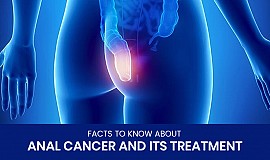About Anal Cancer
Anal cancer is a malignant tumour of either the anal canal or anal verge, the verge of the gastrointestinal tract. It usually spreads through direct invasion into the surrounding tissue or through the lymphatic system. Spread of anal cancer through the blood is less common, although it can occur.
“Cancers arising from the anal verge represent 25% of all anal cancers.”
Anal cancers can cause due to a number of factors, and it forms when normal healthy cells turn into abnormal cells due to some genetic mutation. Under normal conditions cells multiply at a specific rate, and they also die at a specific rate.
In terms of abnormal cancerous cells, they multiply rapidly and importantly, they don’t die off. Meaning that they eventually grow out of control and start accumulating, which leads to the formation of a tumour. If left untreated, these cancerous cells can travel to distant organs, and cause harm to the normal functioning of the body.
linkRisk Factors
Cancer is not an overnight phenomenon, it develops in the body over a period of weeks, months or even years. There are numerous factors that can single handedly or collectively lead to cancer.
Following are some of the risk factors that people should bear precautions towards are:
- Smoking: Patients who smoke are three times more likely to develop anal cancer as those who don't. The risk of anal cancer increases with the number of cigarettes smoked per day, and the number of years that a person has been smoking. Past that, smoking has been linked to numerous types of cancer.
- Drugs: Drugs like crack/ cocaine or immunosuppression medications can suppress the body’s own immune system, making it incapable of dealing with diseases and infections.
- Infections: Sexually transmitted diseases/ infections like the human immunodeficiency virus (HIV), has been linked to anal cancers, moreover, individuals infected with HIV are at an increased risk for infection with Human PapillomaVirus (HPV), which can also lead to anal cancer.
- Weak Immune System: A weak immune system increases the risk of anal cancer. Lack of a nutritious diet is one of the main reasons why people may end up with a weaker immune system in the first place, so taking a balanced meal with adequate amount of vitamins like vitamin C is advised.
- Medical History: Few research studies show that a person who had dealt with cervical or vaginal cancer in the past is vulnerable towards anal cancer.
- Anal Intercourse: Vagina’s lining is thicker and more elastic than that of rectum’s. Rectum lining also lacks any sort of natural lubrication, making it vulnerable to cuts. These cuts can potentially become the gateway for viral and bacterial infections that may lead to anal cancer.
- Older Age: Majority (85%) of cases and incidents of anal cancer have been reported in people who are of advanced age (50+). Patients with anal cancer have an average age of 62 years. Women are much more susceptible towards cancers of the anal canal. Also, the risk of anal cancer increases with increase in age.
Prevention
- Safe Sex: Sexually transmitted infections like HIV and HPV are some of the leading causes of anal cancer. To avoid such infections it is advised that proper lubrication and protection should be used while opting for anal sex. To further reduce the risk, HPV vaccines should be taken.
- Quit smoking: Smoking can lead to a number of health problems including anal cancer. It is advised that one should not start smoking, but if they have, then they should stop immediately.
- Medical tests: A proper, yearly medical test can help people to avoid potential risk of being diagnosed with later stages of cancer, as cancer seldom shows any signs or symptoms in its early stages.
Patients who have anal dysplasia, careful surveillance can result in early detection of anal cancer, and a higher rate of success with treatment. However, removal of areas of anal dysplasia is usually unsuccessful. The rate of recurrence of anal dysplasia after surgical or laser removal is very high.
linkWhat are the Symptoms of Anal Cancer?
There are some initial signs and symptoms that can raise the alarm when it comes to detecting the presence of cancerous tumours in the rectum/ anus.
- In about 50% of cases, the initial symptom of anal cancer is bleeding.
- Pain is somewhat less common; however, it can be quite severe.
- Occasionally, patients have the sensation of having a mass in the anus and can experience itching or anal discharge.
- In advanced cases, anal cancers can disrupt the function of the anal muscles, resulting in loss of control of bowel movements.
- Difficulty in controlling your bowel.
In general, symptoms for anal cancer are vague and non-specific. As a result, in 50% to 33% of the total cases of anal cancer, a delay of up to 6 months occurs between the time when symptoms start and when a diagnosis is made.
How is Anal Cancer Diagnosed?
If a person is experiencing any of the above symptoms, then he or she should consult a doctor to get a proper medical diagnosis of anal cancer treatment. Following are some of the methods that are used to diagnose cancerous growths.
- Endoscopy and Colonoscopy: Doctor uses a short lighted tube with an attached lens or video camera attached to examine the anus, rectum, and part of the large intestine.
- Biopsy: Surgery is done to remove a tissue sample that is examined under a microscope to check for cancer.
Once the diagnosis of anal cancer is made, additional tests are done to determine the extent of cancer’s progression in the body. Some of the diagnostic measures used for cancer staging are:
- CT scan or MRI: This helps to look for abnormally enlarged lymph nodes, which can result from spread of the cancer, and to examine the liver for metastatic disease.
- Chest x-ray: It is often performed to look for spread of the cancer to the lungs.
- Ultrasound: Ultrasound of the tumor using a probe that is inserted into the anus can be used to determine the amount of invasion of the tumor into the surrounding tissues.
Stages of Anal Cancer
After getting diagnosed with anal cancer, a patient needs to know how much progress cancer has made in terms of its overall growth in the body. There are mainly five stages of Anal cancer that one may be diagnosed with:
- Stage 0: the cancer is limited to the cells in the top/ first layer of the anus only. In this stage, cancer cannot be detected via imaging tests. This initial stage is also called carcinoma in situ.
- Stage 1: Cancer cells are limited to the anus itself, and the cancerous tumour has grown to a size of 2 cm, at most.
- Stage 2: cancerous tumour has grown over 2 cm and is located at the anus itself. It hasn’t spread to nearby lymph nodes or other parts/ organs of the body.
-
Stage 3A: In this stage the size of the cancerous tumour may vary from patient to patient. Cancer cells may have spread to nearby lymph nodes or organs like urinary bladder, urethra or, vagina (in case of women).
- Stage 3B: The cancerous tumour has penetrated nearby organs, but hasn’t spread to distant lymph nodes. In this stage the size of the tumour varies. The disease hasn’t spread to distant organs like the lungs or liver.
- Stage 4: Anal cancer has reached the point of metastasis, and has spread to distant lymph nodes and organs of the body.
What are the treatment options for Anal cancer?
Nowadays there are numerous options that one can choose from when it comes to treating anal cancer, like anal cancer surgery etc, but the treatment will mainly depend on the location of the cancerous tumour, its type, its size and the overall stage of progression of cancer cells in the body.
After the presence of cancer is diagnosed and its stage of progression is determined, the next step will be to lay down a proper medical treatment plan that your doctor or anal cancer specialist will analyse after considering the numerous routes of treatment.
One of the key considerations, while treating anal cancer, is saving the anal sphincter muscles, which control the bowel movement. Saving anal sphincter muscles leads to minimal impact on the overall quality of life. In terms of options for treating anal cancer.
The chances of recovery after getting treated for anal cancer depends on the following factors:
- The size of the cancerous tumour.
- The location of the tumour in the anus.
- Whether the cancer has spread to nearby/ distant lymph nodes or not.
How Does Immunotherapy help in treating Anal Cancer?
At Cancer Healer Center, we provide expert care and treatment for all kinds of cancers including anal cancer through Cancer Healer therapy, which is a type of immunotherapy. Immunotherapy, unlike radiation therapy and chemotherapy, strengthens the body’s immune system to fight cancer without leading to any major side effects. However, the given therapy and care will depend on the type of cancer and its stage of progression.
Our Cancer Healer Team plans the anal cancer treatment by taking several factors in consideration, including:
- Type and size of the cancer
- Spread of the cancer
- General health of the patient
After considering all the factors for treatment, the next step is to administer Cancer Healer Therapy, which may be given via the following ways:
- Intravenously (directly into a vein)
- Subcutaneously (under the skin)
- Intramuscularly (directly into muscle tissues)
- Directly through a body cavity
Immunotherapy can also be given in conjunction with other traditional therapies like Chemotherapy and Radiation therapy overcoming their side effects. While choosing the best anal cancer treatment for you, our team will take into consideration your age, your overall health and your personal preferences.
What is Recurrent Anal Cancer?
A cancer is called ‘recurrent’ when it comes back after the initial attempt at treating it. The recurrent cancer can come back at the same site or it can occur in other organs. In case of anal cancer, the recurrent cancer can spread to distant organs like lungs, bones or liver.
A thorough round of diagnostic measure is the first step towards treating recurring anal cancer. The treatment will depend on the site where the cancer has recurred. Recurrent anal cancer at or near the rectum/ anus may require abdominoperineal resection (APR) in which parts or whole of anus, rectum and sigmoid colon are removed.
If you are looking for the best cancer specialists and cancer care in India or abroad, then check out Cancer Healer Center for more information, and contact us now to book your appointment.






